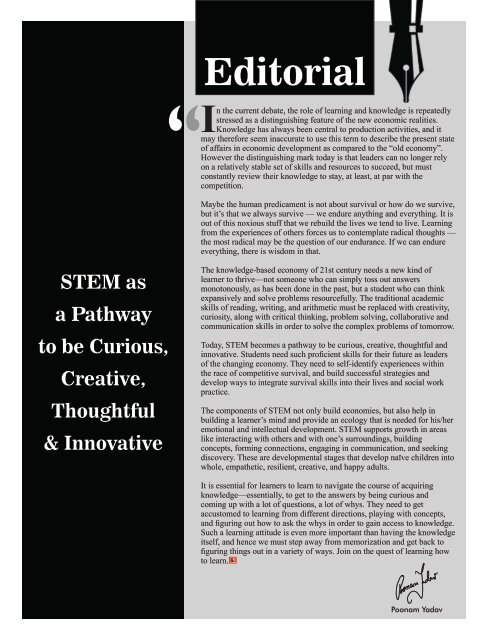The 20 Most Innovative STEM College and Universities to Watch 2017
List of The 20 Most Innovative STEM College & Universities to Watch 2017 which made their own path of success
List of The 20 Most Innovative STEM College & Universities to Watch 2017 which made their own path of success
Create successful ePaper yourself
Turn your PDF publications into a flip-book with our unique Google optimized e-Paper software.
Edi<strong>to</strong>rial<br />
‘‘<br />
n the current debate, the role of learning <strong>and</strong> knowledge is repeatedly<br />
Istressed as a distinguishing feature of the new economic realities.<br />
Knowledge has always been central <strong>to</strong> production activities, <strong>and</strong> it<br />
may therefore seem inaccurate <strong>to</strong> use this term <strong>to</strong> describe the present state<br />
of affairs in economic development as compared <strong>to</strong> the “old economy”.<br />
However the distinguishing mark <strong>to</strong>day is that leaders can no longer rely<br />
on a relatively stable set of skills <strong>and</strong> resources <strong>to</strong> succeed, but must<br />
constantly review their knowledge <strong>to</strong> stay, at least, at par with the<br />
competition.<br />
Maybe the human predicament is not about survival or how do we survive,<br />
but it’s that we always survive — we endure anything <strong>and</strong> everything. It is<br />
out of this noxious stuff that we rebuild the lives we tend <strong>to</strong> live. Learning<br />
from the experiences of others forces us <strong>to</strong> contemplate radical thoughts —<br />
the most radical may be the question of our endurance. If we can endure<br />
everything, there is wisdom in that.<br />
<strong>STEM</strong> as<br />
a Pathway<br />
<strong>to</strong> be Curious,<br />
Creative,<br />
Thoughtful<br />
& <strong>Innovative</strong><br />
<strong>The</strong> knowledge-based economy of 21st century needs a new kind of<br />
learner <strong>to</strong> thrive—not someone who can simply <strong>to</strong>ss out answers<br />
mono<strong>to</strong>nously, as has been done in the past, but a student who can think<br />
expansively <strong>and</strong> solve problems resourcefully. <strong>The</strong> traditional academic<br />
skills of reading, writing, <strong>and</strong> arithmetic must be replaced with creativity,<br />
curiosity, along with critical thinking, problem solving, collaborative <strong>and</strong><br />
communication skills in order <strong>to</strong> solve the complex problems of <strong>to</strong>morrow.<br />
Today, <strong>STEM</strong> becomes a pathway <strong>to</strong> be curious, creative, thoughtful <strong>and</strong><br />
innovative. Students need such proficient skills for their future as leaders<br />
of the changing economy. <strong>The</strong>y need <strong>to</strong> self-identify experiences within<br />
the race of competitive survival, <strong>and</strong> build successful strategies <strong>and</strong><br />
develop ways <strong>to</strong> integrate survival skills in<strong>to</strong> their lives <strong>and</strong> social work<br />
practice.<br />
<strong>The</strong> components of <strong>STEM</strong> not only build economies, but also help in<br />
building a learner’s mind <strong>and</strong> provide an ecology that is needed for his/her<br />
emotional <strong>and</strong> intellectual development. <strong>STEM</strong> supports growth in areas<br />
like interacting with others <strong>and</strong> with one’s surroundings, building<br />
concepts, forming connections, engaging in communication, <strong>and</strong> seeking<br />
discovery. <strong>The</strong>se are developmental stages that develop naïve children in<strong>to</strong><br />
whole, empathetic, resilient, creative, <strong>and</strong> happy adults.<br />
It is essential for learners <strong>to</strong> learn <strong>to</strong> navigate the course of acquiring<br />
knowledge—essentially, <strong>to</strong> get <strong>to</strong> the answers by being curious <strong>and</strong><br />
coming up with a lot of questions, a lot of whys. <strong>The</strong>y need <strong>to</strong> get<br />
accus<strong>to</strong>med <strong>to</strong> learning from different directions, playing with concepts,<br />
<strong>and</strong> figuring out how <strong>to</strong> ask the whys in order <strong>to</strong> gain access <strong>to</strong> knowledge.<br />
Such a learning attitude is even more important than having the knowledge<br />
itself, <strong>and</strong> hence we must step away from memorization <strong>and</strong> get back <strong>to</strong><br />
figuring things out in a variety of ways. Join on the quest of learning how<br />
<strong>to</strong> learn. T R<br />
Poonam Yadav


















